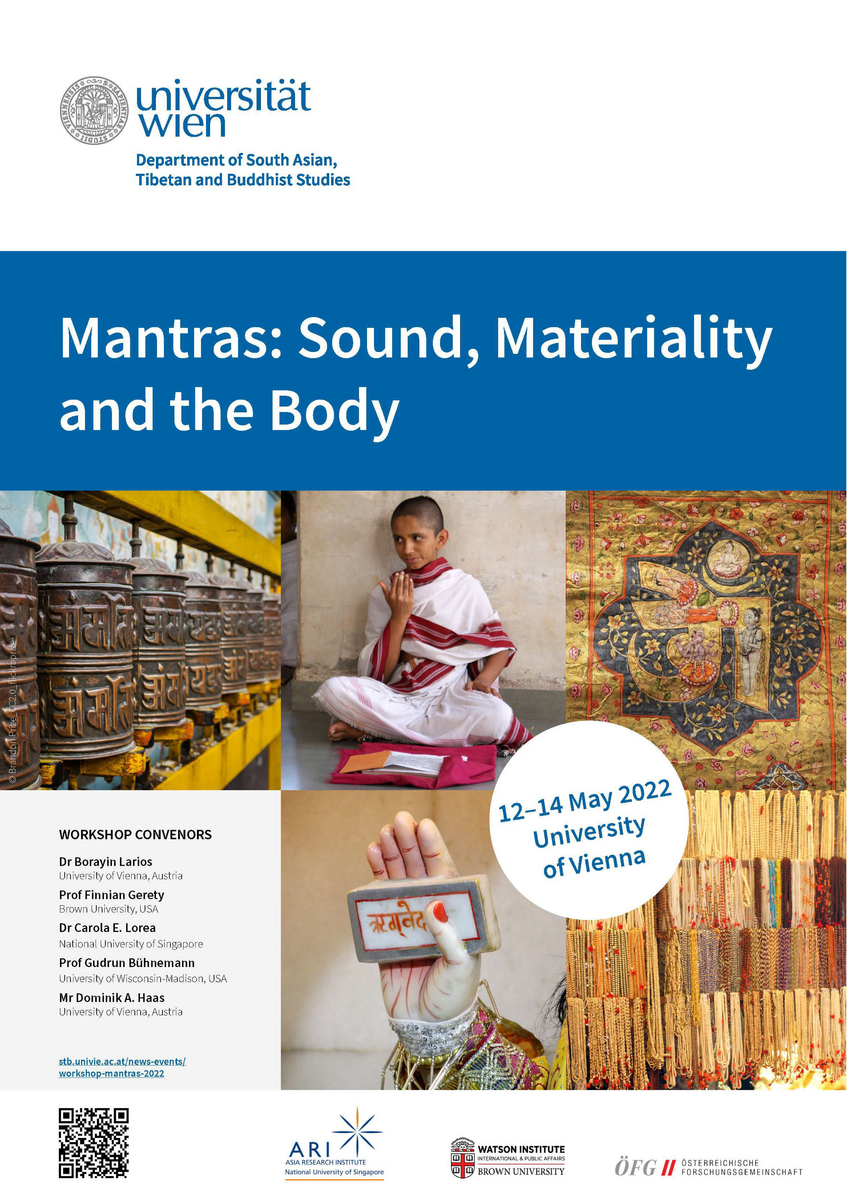Mantras: Sound, Materiality, and the Body
12.05.2022 – 14.05.2022
Workshop at the Department South Asian, Tibetan and Buddhist Studies, University of Vienna
co-organized by the Center for Contemporary South Asia, Brown University
and the Asia Research Institute, National University of Singapore
For the last three thousand years, mantras in Sanskrit and other Indic languages have profoundly influenced religions in South Asia and around the world. Mantras take many forms, materializing in the sound of the human voice, the silence of thought, the script of writing and diagrams, the space of shrines and temples. In spite of the ubiquity and relevance of mantras, academic scholarship on mantras has proceeded in fits and starts, impelled by research on specific texts, traditions, and contexts—but only rarely through the systematic investigation of mantra as a category in its own right. While some studies of mantra in terms of language, sound, and ritual have gained wide attention, the intersections of mantra and other important scholarly categories—the body, performance, media, materiality, religious authority and identity—are relatively unexplored.
“Mantras: Sound, Materiality, and the Body” is an international workshop convened at the the Department South Asian, Tibetan and Buddhist Studies at the University of Vienna and co-organized by the Center for Contemporary South Asia at Brown University and the Asia Research Institute, National University of Singapore. This workshop aims to further the growth of mantra studies by bringing together scholars from various disciplines— religious studies, Asian studies, sound studies, anthropology, art history—around our shared interest in mantras. We will curate several days of conversation on mantras in all their multiformity, with a focus on sound, materiality, and the body.
What is a mantra, exactly? How does the philosophy of mantra relate to practice (and vice versa)? What role does embodiment play in mantra systems? How do mantras mediate between practitioners and their material or spiritual goals? How do mantras change when adapted to new technologies and media? How do mantras shape identities, communities, and traditions?
With the aim of grappling with these big questions (and more), we are calling for papers on mantras in premodern and contemporary contexts, in major Asian religions as well as global spiritualities, and addressing texts, practices, material culture, lived religion, and critical theory. Proposals may be works-in-progress, ideas for future research projects, summations of previous research, and theoretical or methodological interventions. We encourage contributions that span disciplines, consider mantras in vernacular languages and popular traditions, address neglected domains of inquiry, examine mantras using digital and audio-visual resources—and otherwise cultivate synergy between scholars working on mantra with different materials, approaches, and framings. This workshop will offer a forum for exploring future collaborations on mantras and the prospects for securing funding for a multi-year, international research project on mantras.
Program
Registration for the workshop is closed; there will be no recordings. Guests affiliated with the University of Vienna or the Austrian Academy of Sciences are welcome on site and online. If you intend to come in person, please write a short email to Dominik A. Haas (dominik@haas.asia).
→ download program, including the abstracts
Workshop Convenors
Dr Borayin Larios | borayin.larios@univie.ac.at
Department of South Asian, Tibetan and Buddhist Studies, University of Vienna, Austria
Prof Finnian Gerety | finnian_moore-gerety@brown.edu
Center for Contemporary South Asia, Brown University, USA
Dr Carola E. Lorea | aricar@nus.edu.sg
Asia Research Institute, National University of Singapore
Prof Gudrun Bühnemann | gbuhnema@wisc.edu
Department of Asian Languages and Cultures, University of Wisconsin-Madison, USA
Mr Dominik A. Haas, MA | dominik@haas.asia
Department of South Asian, Tibetan and Buddhist Studies, University of Vienna, Austria
Institute for the Cultural and Intellectual History of Asia, Austrian Academy of Sciences, Austria
Ms Valerie Yeo | valerie.yeo@nus.edu.sg (Secretariat)
Asia Research Institute, National University of Singapore
Speakers
Saskia Abrahms-Kavunenko | University of Copenhagen, Denmark
Andrea Acri | École Pratique des Hautes Études (EPHE), PSL University & École française d’Extrême-Orient (EFEO), France
Vitus Angermeier | Universität Wien, Austria
Christèle Barois | Institut d'études avancées de Nantes, France
Daniela Bevilacqua | SOAS University of London, UK
Joel Bordeaux | Leiden University, Netherlands
Julia Byl | University of Alberta, Canada
Keith Edward Cantú | Jagiellonian University in Kraków, Poland
Mery Cecconi | University of Leiden, The Netherlands
Rae Dachille | University of Arizona, USA
Neil Dalal | University of Alberta, Canada
Kush Depala | Heidelberg University, Germany
Madhavi Godbole | Deccan College Post-graduate and Research Institute, India
Dominik A. Haas | University of Vienna, Austria
Shaman Hatley | University of Massachusetts, USA
Kathrin Holz | Université de Lausanne, Switzerland
Jan E.M. Houben | Ecole Pratique des Hautes Etudes, Sciences historiques et philologiques – Paris Sciences et Lettres, France
Joanna Jurewicz | University of Warsaw, Poland
Maciej Karasinski | Hainan University, China
Georgi Krastev | University of Vienna, Austria
Liwen Liu | University of Toronto, Canada
Adrián Muñoz | El Colegio de México
Alexander James O’Neill | SOAS University of London, UK
Lubomír Ondračka | Charles University, Prague
Vaishnavi Patil | Harvard University, USA
Hemant P. Rajopadhye | University of Mumbai and Ahmedabad University, India
Mani Rao | Independent scholar, India
S. A. S. Sarma | École française d’Extrême-Orient (EFEO), Pondicherry, India
Patricia Sauthoff | University of Alberta, Canada
Katherine Scahill | University of Pennsylvania, USA
Nike-Ann Schröder | Humboldt Universität Berlin, Germany
Katrin Stamm | International Center, Europa-Universität Flensburg, Germany
Shilpa Sumant | Deccan College Post-graduate and Research Institute, India
Richard David Williams | SOAS University of London, UK
Poster

